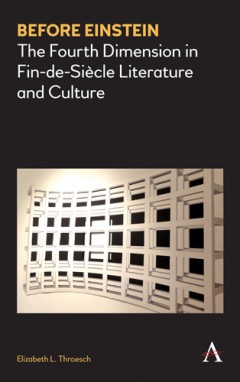Before Einstein
The Fourth Dimension in Fin-de-Siècle Literature and Culture
By Elizabeth L. Throesch
- About This Book
- Reviews
- Author Information
- Series
- Table of Contents
- Links
- Podcasts
About This Book
‘Before Einstein’ examines the discourse of hyperspace philosophy and its position within the network of ‘new’ ideas at the end of the nineteenth century. Hyperspace philosophy grew out of the concept of a fourth spatial dimension, an idea that became increasingly debated amongst mathematicians, physicists and philosophers during the 1870s and 80s. English mathematician and hyperspace philosopher Charles Howard Hinton was the chief populariser of the fourth dimension in Europe and North America. The influence of his writings, many of which were published as a series under the title of ‘Scientific Romances’, ranged surprisingly wide.
‘Before Einstein’ offers, for the first time, an extended examination of Hinton’s work and – crucially – the influence of his ideas on contemporary writers and thinkers. Increasingly over the past three decades, critical attention has been given to the relevance of pre-Einsteinian theories of the fourth dimension within the shifting aesthetic and cultural values at the turn of the twentieth century. For the first time in a full-length literary study, ‘Before Einstein’ addresses the cultural life of the fourth dimension at the turn of the century. ‘Before Einstein’ begins by tracing the development of spatial theories of the fourth dimension out of the ‘new’, non-Euclidean geometries of the mid-nineteenth century, and proceeds to analyse Hinton’s role as four-dimensional theorist and populariser of hyperspace philosophy. Hinton's ‘Scientific Romances’ are examined in detail, not simply as documents of interest for historians of science and ideas, but for their intrinsic literary value as well. Additionally, ‘Before Einstein’ captures the work of H. G. Wells, Henry James and William James through the lens of Hinton’s writing, identifying what can be described as a four-dimensional literary aesthetic. The book addresses the existing gap in literary studies of the fourth dimension, while also providing scholars of the James brothers and Wells with new ways of approaching their subject matter.
Reviews
This lively and daring book connects several socio-historical threads in late-nineteenth-century Anglo-American culture. Most importantly, how did the idea of the fourth dimension pass from the field of analytical geometry to that of fiction, psychology, and aesthetics?'
—Kate Holerhoff 'English Literature in Transition 1880–1920', Vol 61, No. 3, pp. 396–399.
‘This is among the most innovative studies of the relationships between literature and science, yielding wholly fresh understandings of modernist culture while its attention to the neglected figure of Hinton marks a major advance in scholarship.’ —Ian F. A. Bell, Professor of American Literature, School of Humanities, Keele University, UK
‘Before Einstein nicely consolidates and extends scholarly discussion on the spatial fourth dimension as it moves through physics, mathematics, literature and art. The study presents a compelling historical treatment of one of the most fascinating chapters of Anglo-American aesthetics at the turn of the twentieth century.’ —Bruce Clarke, Paul Whitfield Horn Professor of Literature and Science, Texas Tech University, USA
Author Information
Elizabeth Throesch received her PhD from the University of Leeds in 2007. She has published articles and book chapters on Lewis Carroll, Herbert Spencer and Charles Howard Hinton, among others.
Series
Anthem Nineteenth-Century Series
Table of Contents
Acknowledgements; Introduction; Part I:Reading the Fourth Dimension; 1. Imagining ‘Something Perfectly New’: Problems of Language, Conception and Perception; 2. Constructing the Fourth Dimension: the First Series of the Scientific Romances; 3. The Four-Dimensional Self: Personal, Political and Untimely; Part II:Reading Through the Fourth Dimension; 4. Four-Dimensional Consciousness: the Correspondence between William James and Charles Howard Hinton; 5. H. G. Wells’s Four-Dimensional Literary Aesthetic; 6. Exceeding ‘the Trap of the Reflexive’: Henry James’s Dimensions of Consciousness; Afterword; Bibliography; Index.
Links
Stay Updated
Information
Latest Tweets



